|
|
|
Sort Order |
|
|
|
Items / Page
|
|
|
|
|
|
|
| Srl | Item |
| 1 |
ID:
163449
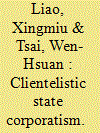

|
|
|
|
|
| Summary/Abstract |
United front work has played an important role in the history of the
Chinese Communist Party (CCP). Since 2012, Xi Jinping has strengthened the united front system’s e�cacy and further proposed formation
of a “great united front.” He holds that united front work’s essence is
“making friends,” in which regard the CCP under Xi has introduced a
new practice called “pairing-up.” It stipulates that local governments at
all levels must facilitate establishment of “friendly” relations between
members of Party committees and specific persons in charge of
so-called democratic parties to further implementation of united front
work. This new form of united front embodies “clientelistic state
corporatism.” We use the case of L City to analyze the united front
model of pairing-up, its e�ects and limitations, and the CCP’s social
control strategy
|
|
|
|
|
|
|
|
|
|
|
|
|
|
|
|
| 2 |
ID:
153388
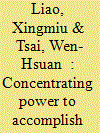

|
|
|
|
|
| Summary/Abstract |
This article discusses the operations of the Chinese Communist Party (CCP) pishi system from the perspective of decision making. As an authoritarian regime, the CCP ‘concentrates power to accomplish big things’, demonstrating the extent of the CCP’s state capacity. This article argues that, through a wide range of documentation, the CCP provides leaders with a channel for resource accumulation, to issue pishi (written directives). Next, mishu (secretaries) play an extremely important role in the transmission of documents and the execution of pishi. This article then goes on to point out that the CCP’s practice of nomenklatura is a key means to ensure that pishi are executed as expected. Finally, this article discusses the advantages and disadvantages of the pishi system.
|
|
|
|
|
|
|
|
|
|
|
|
|
|
|
|
| 3 |
ID:
181930
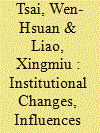

|
|
|
|
|
| Summary/Abstract |
The Chinese Communist Party (CCP) regards the Communist Youth League (CYL) as a critical and distinctive mass organization that acts as an “assistant” and “reserve army” for the Party. This article uses the analytical concepts of historical institutionalism and critical junctures to discuss the changes in the CYL during the post-Mao period. We focus on two critical junctures: 1982, when the CYL became a route to rapid promotion for cadres, and 2016, after which its cadres had fewer opportunities for promotion and the CYL was pushed back to its original role in youth United Front work. We also find that the CYL has refined its United Front methods to attract talented young people by offering them services. This reflects the efforts of the CCP regime to adapt to circumstances and ensure its survival.
|
|
|
|
|
|
|
|
|
|
|
|
|
|
|
|
| 4 |
ID:
165223
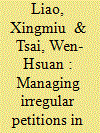

|
|
|
|
|
| Summary/Abstract |
This paper uses Province A and City T as case studies to explore the strategies used by the Chinese Communist Party (CCP) for managing citizens’ “irregular letters and visits” (irregular petitions) and the logic behind them. We believe that the local officials use both “hard” and “soft” measures to exercise control over these activities. The soft measures include persuasion and negotiation aimed at getting petitioners to abandon their irregular petitions. The hard measures involve the use of the coercive power of the state to compel the petitioners to return home. During important political meetings and holiday periods, both of which are popular times for petitioning, the CCP is more likely to take a hard approach to resolve serious problems and maintain stability. In normal times, it generally uses less costly soft tricks. These two social control strategies are utilized alternately by the CCP to maintain social stability and guarantee its regime survival.
|
|
|
|
|
|
|
|
|
|
|
|
|
|
|
|
| 5 |
ID:
173793
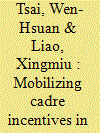

|
|
|
|
|
| Summary/Abstract |
This article discusses the ways in which the Chinese Communist Party (CCP) mobilizes local governments to implement policies set by higher-level governments. Using the concept of ‘institutionalized mobilization’, we discuss poverty alleviation in H county. We identify three key mechanisms: the cross-system leading group, cross-level personnel/financial management, and pairing-up. These mechanisms involve both the adjustment of tiao tiao (条条) and kuai kuai (块块) relationships within the bureaucracy and the strengthening of state–society relations. We also point out the many problems resulting from this mode of institutionalized mobilization. Finally, we compare the political and geographical conditions in H county with those in two other counties – E and K – to ascertain whether the results of poverty alleviation are sustainable.
|
|
|
|
|
|
|
|
|
|
|
|
|
|
|
|
| 6 |
ID:
176602
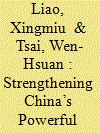

|
|
|
|
|
| Summary/Abstract |
On becoming paramount leader, Xi Jinping, with the assistance of Wang Qishan, augmented the powers of the Commission for Discipline Inspection (CDI), the body charged with investigating wrongdoing by government and Party employees. To consolidate his power, Xi merged a number of different departments into a “great system of supervision and investigation,” known as the National Supervisory Commission (NSC). The CDI acts as the core body of the NSC, and it scrutinizes cases of corruption and malfeasance in coordination with relevant departments. The most important aspects of this process are “placing a case on file” (li’an) and “detention” (liuzhi). This article seeks to throw light on the CDI’s investigation process through extensive fieldwork carried out in County J.
|
|
|
|
|
|
|
|
|
|
|
|
|
|
|
|
|
|
|
|
|